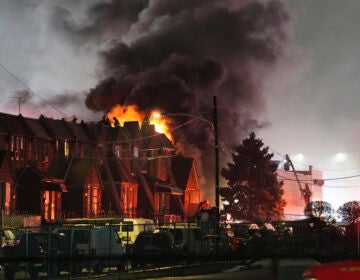U.S. judge: Sessions can’t deny grant to Philadelphia for being ’sanctuary city’ [updated]
The judge's decision represents a significant blow to Attorney General Jeff Sessions, who has sought to punish so-called sanctuary cities.
Listen 2:23
Attorney General Jeff Sessions (AP, file)
The Department of Justice cannot deny Philadelphia public safety grants for not fully cooperating with immigration authorities, a federal judge ruled Wednesday.
U.S. District Judge Michael Baylson’s decision represents a significant blow to Attorney General Jeff Sessions, who has sought to punish cities such as Philadelphia, which have been termed ‘sanctuary cities,’ for not better assisting immigration agents in questioning and detaining people who may be in the country illegally.
And the decision marks a major victory for Mayor Jim Kenney, whose administration has made protecting unauthorized immigrants a political priority in the face of the Trump administration’s immigration crackdown. In August, city officials sued Sessions over the strings the DOJ attempted to attach to the grant money.
While the city has prevailed for now, the mayor acknowledged that the battle is far from over.
“The administration in Washington will continue pressing its views about how we should treat immigrants and will demonize them as a group,” Kenney said. “But, as the court noted, we know what we’re doing in Philadelphia, and we won’t scare our law-abiding immigrants back in the shadows.”
The Justice Department is reviewing Baylson’s ruling before it determines its response, a spokesman said.
But the decision puts the city at risk, according to spokesman Devin O’Malley.
“In Philadelphia, 2017 homicides have already eclipsed 2016’s numbers, and so-called ‘sanctuary policies’ further undermine public safety and law enforcement,” O’Malley said.
Kenney responded that immigrants are not committing the majority of murders and that the homicide rate is not related to how much information is shared with ICE.
“If they want to blame someone for homicides in our society, they should look in the mirror, because they won’t do anything about guns,” Kenney told reporters Wednesday afternoon.
The funding in question, an Edward Byrne Memorial Justice Assistance Grant, also known as the JAG program, supports police overtime and court equipment. In its latest application for $1.6 million, the city said it plans to devote the funds to fighting the opioid epidemic, which last year claimed the lives of more than 900 people.
At issue was whether Sessions could force Philadelphia to provide the federal government with the immigration status of people in city custody by making the disclosure a requirement of grant funding.
The judge sided with Philadelphia.
Other cities may use ruling as playbook
“The public interest is better served if the city is not forced to choose between forgoing the JAG grant funds and losing hard-fought good will amongst the immigration community,” Baylson wrote.
Justice officials attached new conditions to the grant funding cities, including Philadelphia, have received for years. Among the new terms: that federal immigration authorities have unlimited access to the city’s jails and also provide agents with a two-day notice before an immigrant inmate is released from local custody.
In September, a federal judge in Chicago issued a nationwide ruling blocking those two. The third condition, concerning cities following a federal law barring restricted communication with the Department of Homeland Security, was still in place. But on Wednesday, Baylson ruled that Philadelphia is in “substantial compliance” with that law.
Philadelphia City Solicitor Sozi Tulante said that Baylson’s ruling will likely become a “framework” for other cities attempting to knock down the requirement in the courts.
Lawyers for the city have called the new requirements “concocted.”
“Congress did not give the department the authority to add this type of mandate,” wrote lawyer Sara Solow, who is representing the city, in a recent filing to the court.
And giving U.S. Immigration and Customs Enforcement agents a heads-up is just not practical, Solow noted.
“A judge may order release at a bail hearing, which the city would try to accomplish within four hours,” she wrote. “Or a law enforcement official may decide not to pursue charges against the individual,” letting that person go.
Solow said DOJ officials have offered no evidence that disclosing to the federal government an inmate’s immigration status would improve public safety.
“Merely being in the country without a valid immigration status is not a crime and does not make someone a criminal threat,” Solow wrote.
On all of these points, Baylson agreed.
“Disclosing immigration status to ICE has nothing to do with law enforcement, and will not prevent crime,” Baylson noted.
City already sharing data with ICE
The city already shares a considerable amount of information with ICE, which has access to databases of everyone who is stopped, arrested, booked or convicted of crimes in Philadelphia. Another system, the Preliminary Arraignment System, known as PARS, lists a defendant’s name, address, place of birth and upcoming court dates. ICE has access to the database.
Still, DOJ officials said they wanted additional information sharing — including a suspect’s immigration status — but the city’s confidentiality rules prevent city officials from sharing those details with federal authorities.
“The city’s mandates of non-cooperation can mean that aliens convicted of violent crimes are released back into the community rather than into ICE custody to face removal proceedings,” Acting Assistant Attorney General Chad Readler wrote to the judge in a recent filing.
Baylson said those claims are not supported by evidence.
“Arrest and prosecution of non-citizens who have committed crimes is an important part of law enforcement,” he wrote. “However, disclosing their immigration status to ICE has nothing to do with law enforcement, and will not prevent crimes.”
Under city policy, those in local custody are held for ICE agents only if they obtain a warrant signed by a judge or of the individual has been convicted of a serious felony. Justice officials have said it is their practice to obtain administrative warrants for an immigration arrest, but Baylson said that is not sufficient.
“Obtaining a judicial warrant is not a burdensome procedure. ICE enforcement officers are well trained in preparing warrants based on ‘probable cause’ as the Fourth Amendment of the United States Constitution provides,” Baylson said.
Attempting to relieve community’s fear
The city has fought to preserve its measures to shield the status of immigrants as concerns about deportation in many immigrant communities have ratcheted up since the Trump administration began doubling down on ICE arrests nationwide, according to Tulante.
“People are very afraid. People are anxious. They don’t feel comfortable going to the federal government if they’re concerned. They come to us,” Tulante said. “And they’re worried that if we change our policies in any way, this will be a slow erosion of the protections that we’ve afforded to them.”
Of the estimated 11 million people in the country illegally, Baylson said about 8 percent can be considered “criminal aliens.” Roughly one-half of the 11 million have overstayed their visa; for generations, that has not been a deportation priority for federal immigration authorities.
In his ruling, Baylson said he worried that Session’s grant conditions would result in deporting people whose primary issue is an expired visa, which the U.S. Supreme Court has held is not a crime. However, because they are in the country illegally, they technically can be deported.
That includes, for example, someone arrested for a minor crime, but not convicted, or someone held in contempt of court for not paying child support and jailed because they cannot afford bail.
“None of these groups can be considered criminal aliens,” Baylson wrote.
The politically charged moniker “sanctuary city,” the judge added, needs to be shed, at least for Philadelphia.
“This court rejects it as a misnomer,” Baylson wrote. “Philadelphia is not a sanctuary for anyone involved in criminal conduct, nor is it a sanctuary as to any law enforcement investigation, prosecution, or imprisonment after having been found guilty of a crime. The court does not need a label for Philadelphia’s policies.”
WHYY is your source for fact-based, in-depth journalism and information. As a nonprofit organization, we rely on financial support from readers like you. Please give today.




